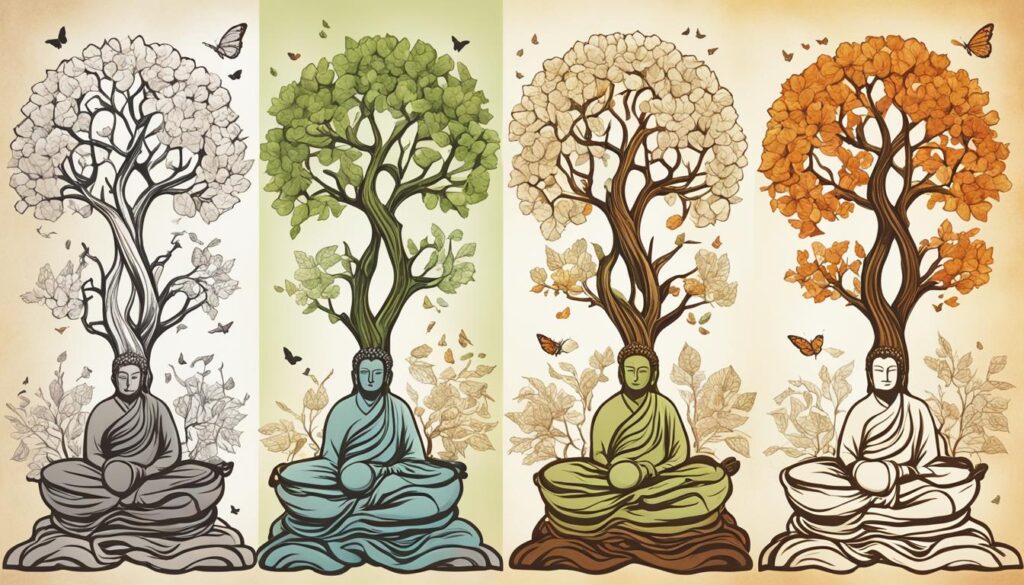Are you seeking inner peace and tranquility? Do you long for a break from the chaos of everyday life? Look no further than Buddhism holidays. These unique getaways offer much more than just a vacation – they provide a transformative experience that allows you to delve into the teachings and practices of Buddhism, finding serenity amidst the hustle and bustle of the modern world.
During these holidays, you can immerse yourself in spiritual retreats, embark on sacred journeys, and discover the power of meditation and mindfulness. Whether you are a seasoned practitioner or new to Buddhism, these holidays offer a space for self-reflection, personal growth, and deepening your understanding of this ancient philosophy.
Ready to embark on a journey of self-discovery and find inner peace? Join us as we explore the wonders of Buddhism holidays and uncover the transformative power they hold.
Key Takeaways:
- Discover the teachings and practices of Buddhism through immersive holidays
- Find serenity and inner peace amidst the chaos of modern life
- Explore spiritual retreats, sacred journeys, and meditation vacations
- Cultivate mindfulness, personal growth, and self-reflection
- Deepen your understanding of Buddhism and its profound wisdom
The Eightfold Path of Buddha: Guiding Principles for Harmony and Enlightenment
The Eightfold Path of Buddha is a profound and transformative framework that guides individuals on their journey towards harmony and enlightenment. Rooted in the teachings of Buddhism, this path consists of eight principles that provide invaluable guidance for cultivating mindfulness, compassion, and ethical conduct.
- Right understanding: Gain a deep comprehension of reality and the true nature of existence.
- Right thought: Cultivate positive and wholesome thoughts, fostering inner peace and wisdom.
- Right speech: Use words to promote kindness, truth, and understanding, while refraining from harmful speech.
- Right action: Engage in actions that are morally upright, avoiding harm to oneself and others.
- Right livelihood: Earn a living through ethical means that do not cause harm.
- Right effort: Exert conscious effort in cultivating wholesome qualities and letting go of negative ones.
- Right mindfulness: Develop moment-to-moment awareness and presence, observing the mind and body with clarity.
- Right concentration: Cultivate focused and tranquil states of mind through meditation, leading to deep insight and spiritual development.
By following the Eightfold Path, individuals not only gain personal guidance on their own spiritual journey but also contribute to the creation of a harmonious and just society. These principles serve as a compass, fostering personal growth while promoting societal harmony through ethical conduct and compassionate action.
Mindfulness and Compassion: Essential Elements of the Eightfold Path
Mindfulness and compassion, two key elements of the Eightfold Path, play a pivotal role in the pursuit of harmony and enlightenment. Mindfulness involves cultivating awareness of the present moment, allowing individuals to be fully present and engaged in their experiences. This practice enables a deep understanding of the impermanent nature of reality and facilitates the development of wisdom, creating a foundation for personal and societal harmony.
Compassion, on the other hand, encompasses empathy and a genuine concern for the well-being of all beings. By cultivating compassion, individuals recognize the interconnectedness of all life and strive to alleviate the suffering of others. This practice fosters a sense of connection and unity, promoting harmony within oneself and in relation to others.
Through the incorporation of mindfulness and compassion into everyday life, individuals not only enhance their personal well-being but also contribute to the establishment of a more compassionate and harmonious society.

Embarking on the Eightfold Path of Buddha is a transformative journey that leads to personal growth, enlightenment, and the realization of inner harmony. By embracing the principles of right understanding, right thought, right speech, right action, right livelihood, right effort, right mindfulness, and right concentration, individuals cultivate a profound sense of wisdom, compassion, and personal and societal harmony. As you traverse this path, you discover the transformative power of Buddhism and embark on a transformative journey towards self-discovery and spiritual awakening.
The Four Noble Truths: Understanding the Nature of Suffering and Liberation
In Buddhism, the Four Noble Truths serve as the guiding principles for understanding the nature of suffering and finding liberation from it. These profound teachings offer valuable insights into the human condition and provide a pathway to ultimate peace and freedom.
The First Noble Truth: Acknowledging the Existence of Suffering
The first noble truth recognizes that suffering is an inherent part of human existence. It acknowledges the physical, emotional, and mental pain that individuals experience throughout their lives. Whether it is grief, illness, or the dissatisfaction that arises from unfulfilled desires, suffering is ever-present.
The Second Noble Truth: Exploring the Causes and Conditions of Suffering
The second noble truth delves into an analysis of the causes and conditions that give rise to suffering. It teaches us that craving and attachment to worldly desires, ignorance, and the illusion of a separate self are at the root of our suffering. By understanding the underlying causes, we can begin to address them and find the path to liberation.
The Third Noble Truth: Discovering the Possibility of Liberation from Suffering
The third noble truth brings hope and offers the possibility of liberation from suffering. It assures us that there is an end to suffering, and that freedom from pain is attainable through spiritual awakening. By transcending our attachments and delusions, we can experience profound peace and liberation.
The Fourth Noble Truth: Following the Path to Healing
The fourth noble truth provides guidance on the path to healing and liberation. It introduces the Noble Eightfold Path, which consists of right understanding, right thought, right speech, right action, right livelihood, right effort, right mindfulness, and right concentration. By cultivating these qualities and practicing them in daily life, we can alleviate suffering and find true healing.
In summary, the Four Noble Truths of Buddhism shed light on the nature of suffering and offer a roadmap to liberation. By acknowledging suffering, understanding its causes, realizing the possibility of freedom, and following the path to healing, individuals can embark on a transformative journey towards inner peace and liberation.
| Noble Truth | Description |
|---|---|
| First Noble Truth | Acknowledging the existence of suffering |
| Second Noble Truth | Exploring the causes and conditions of suffering |
| Third Noble Truth | Discovering the possibility of liberation from suffering |
| Fourth Noble Truth | Following the path to healing |

The Lotus Flower: Symbolism and Significance in Buddhism
The lotus flower holds deep symbolism and significance in both Buddhism and Hinduism. In Buddhism, the lotus flower is considered a sacred symbol that represents purity, spiritual awakening, and the journey toward enlightenment. Its beauty and resilience serve as a powerful reminder of the inherent potential for growth and enlightenment within every individual.
The lotus flower has a unique ability to grow and bloom in muddy waters, symbolizing the potential for transformation and liberation from suffering. This symbolism teaches individuals that despite the challenges and hardships they may face in life, they too have the ability to rise above and find their path to enlightenment.
Additionally, the lotus flower is often associated with the image of the Buddha, further reinforcing its significance in Buddhist traditions. It serves as a visual representation of the Buddha’s teachings and embodies the principles of compassion, mindfulness, and wisdom.
Exploring the symbolism of the lotus flower can deepen one’s understanding of the spiritual path and inspire a greater sense of connection to the teachings of Buddhism. It serves as a visual reminder that amidst the chaos and turmoil of the world, there is always a potential for inner peace, growth, and enlightenment.

Embracing the symbolism of the lotus flower, individuals can find solace and inspiration on their own spiritual journey. Just as the lotus flower blossoms from the depths of muddy waters to reveal its radiant beauty, so too can individuals cultivate their inner qualities and blossom into their full potential.
Conclusion: Finding Inner Peace and Enlightenment Through Buddhism Holidays
Embrace an extraordinary journey of self-discovery and inner transformation by embarking on a Buddhism holiday. These serene and enlightening getaways offer a profound opportunity to delve into the teachings and practices of Buddhism, guiding you towards personal growth, mindfulness, compassion, wisdom, and profound insight.
During these spiritual retreats, meditation vacations, and sacred journeys, you will find a tranquil space to connect with your true self and the world around you. As you explore the profound teachings of Buddhism, you will uncover a path to inner peace and forge a deeper understanding of your place in the modern world.
By immersing yourself in the wisdom of Buddhism holidays, you can cultivate mindfulness, embracing the present moment with serenity, clarity, and acceptance. This mindful awareness will enable you to navigate the challenges of life with compassion and wisdom, fostering personal growth and a harmonious society.
Unlock the transformative power of Buddhism holidays, where serenity and self-discovery await. Embrace the journey towards enlightenment, where you will find solace, wisdom, and a profound sense of connectedness to both yourself and the world. Seize the opportunity to embark on a journey of personal and spiritual growth, as you explore the depths of your being and awaken the innate wisdom and insight within.
FAQ
What are Buddhism holidays?
Buddhism holidays are special occasions for individuals to explore the teachings and practices of Buddhism, allowing them to find inner peace and serenity in the midst of modern life.
What can I expect from a Buddhism holiday?
Buddhism holidays offer a variety of experiences, including spiritual retreats, meditation vacations, mindfulness getaways, and sacred journeys. These holidays provide a space for self-reflection, mindfulness, and personal growth.
Why is the Eightfold Path important in Buddhism?
The Eightfold Path of Buddha is a guiding framework that encompasses eight principles essential for achieving harmony and enlightenment. It teaches individuals how to cultivate mindfulness, compassion, and ethical conduct, both in their personal lives and in society.
What are the Four Noble Truths of Buddhism?
The Four Noble Truths address the nature of suffering and the path to liberation. They acknowledge the existence of suffering, explore its causes, offer the possibility of liberation, and provide guidance on the path to healing.
What does the lotus flower symbolize in Buddhism?
The lotus flower is a sacred symbol in Buddhism, representing purity, spiritual awakening, and the journey toward enlightenment. It symbolizes the potential for transformation and liberation from suffering, as it grows and blooms in muddy waters.
How can Buddhism holidays help me find inner peace and enlightenment?
By participating in Buddhism holidays, you can embrace serenity, cultivate mindfulness and compassion, and address modern challenges with wisdom and insight. These holidays offer a transformative experience that allows for personal and spiritual growth.

